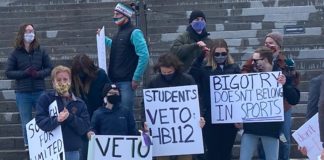Robert Sarver was suspended by the NBA on Tuesday after an independent law firm wrapped an investigation into his behavior that included accusations of racism, misogyny and bullying in the workplace.
While some of the accusations were not corroborated, the investigation did find witness accounts of many indiscretions that fall under those lines.
A key sentence in the findings from Wachtell, Lipton, Rosen & Katz said there was “no finding that Sarver’s conduct was motivated by racial or gender-based animus.”
In a statement, Sarver’s lawyers pointed out the investigation showed that “none of Mr. Sarver’s actions or comments were based on racist, prejudiced, or misogynistic intent.” Sarver in his own statement said he disagree with “some of the particulars” of the report but apologized and said he takes responsibility for his actions.
Perhaps the lack of “intent” in Sarver’s actions is what separates his punishment — a one-year suspension and $10 million in fines — from the NBA banning former Los Angeles Clippers owner Donald Sterling for life due to evidence of racist comments.
Nonetheless, the confirmed offenses by Sarver in the investigation of the Suns runs long, painting a picture that Sarver continued with his behaviors despite being confronted about their inappropriateness.
Here is a distilled version of the 43 pages of conclusions Wachtell, Lipton, Rosen & Katz drew after investigating Sarver and the Suns:
Use of the N-word
— During a 2004 meeting with a free agent, Sarver told a story about attending the University of Arizona as a college student. He used the N-word when explaining what a Black person had said. Four witnesses said it was uncomfortable, and one witness told Sarver he could not say that word — even if speaking on what someone else said.
— In the 2012-13 season for a team-building exercise, players were asked to compliment one another. One Black player said that a white Suns player had “‘something African Americans call (N-word) in him.’ Sarver summarized what the players had said and, in doing so, repeated the word.”
Sarver again was told he could not use the word. Sarver recalled to investigators that he said the player should not use the word and instead say “We’re in the foxhole together,” but none of the witnesses recalled that framing.
— After an Oct. 30, 2016 game against Golden State, Sarver complained that a Black player on the Warriors was able to say the N-word without receiving a technical. Sarver used the word when he went into a coach’s office to vent about the non-calls. The coach told Sarver he could not say the word. The owner then sent an email to the league office, complaining about the officiating. Sarver “purported to quote the Warriors player as saying the N-word spelled out with an ‘a’ at the end,” per the investigation.
— On two occasions, from 2010-2017, Sarver quoted a player’s family member as using the N-word when recounting a story about them boarding a team plane.
Other incidents implicating race
The investigation found three additional instances where Black coaches took Sarver’s comments to be implicating some form of racism.
In one incident, Sarver asked a Black coach what should change in the organization. The coach said “diversity,” which he meant to be about racial diversity. Sarver “’erupt[ed],’ saying, ‘No, no, no, I hate diversity.’” The coach and a witness, who in the moment tried to keep the coach calm, believed Sarver was pushing back against racial diversity. Sarver to investigators claimed he thought the comment from the coach was about “offensive and defensive basketball principles (contending it was best for all coaches to have a consistent basketball philosophy).”
Another instance appears to involve the eventual firing of Suns head coach Earl Watson, the holdout of point guard Eric Bledsoe and their shared agent, Rich Paul. It has previously been reported by ESPN.
Before the 2017–18 season, the Black founder and executive of a sports agency had a contentious negotiation with Sarver and the Suns on behalf of a Black Suns player. During the negotiation, Sarver told the agency executive, whose agency also represented a Black Suns coach, that dual representation of both a coach and a player constituted a conflict of interest, and that he would fire the coach unless the coach first fired the agency. Word of that ultimatum got back to the coach, who confronted Sarver and communicated that he perceived the ultimatum to have racial connotations, given that the coach, agency executive, and player are all Black and Sarver is white. Sarver confirmed his threat to the coach, and the coach refused to fire the agency. Shortly thereafter, Sarver fired the coach.
When interviewed by investigators, Sarver admitted these facts but denied that the dispute with the coach, or the coach’s firing, had anything to do with race. Sarver also denied the coach’s allegation that during the dispute the coach raised a concern that Sarver’s actions had racial connotations. Sarver explained that the agency executive had demanded during their difficult negotiation that the Suns trade the Suns player. Sarver said he told the coach that this trade demand was hurting the team’s performance and would in turn damage the coach’s reputation, creating a conflict of interest for the coach. Sarver also said that the firing of the coach was prompted by the recommendation of his front office staff, who complained to Sarver that the coach was acting unprofessionally in front of the players.
Demeaning women
— In 2008, Sarver told a pregnant employee she could not continue her role coordinating an event because “she would be ‘breastfeeding’ and her ‘baby needs their mom, not their father.’” The woman cried in response, and when a witness told Sarver he did not act correctly, the owner convened a call with that witness and his attorney. Sarver’s attorney said he had done nothing wrong, and Sarver criticized the witness for “questioning Sarver’s judgment.”
— Sarver is accused of, in March 2011, screaming at a female employee for a video she prepared for another employee who was about to leave the Suns. The employee was then in tears and told a witness she wanted to leave her job. A week later, Sarver went to the employee’s office and “said in substance, ‘Why can’t we get along? What’s wrong with you?’ When the female employee began to cry, Sarver then said in a raised voice, ‘Why do all the women around here cry so much?’” Witnesses heard Sarver yell at the female employee.
“Not long after” that incident, Sarver arranged a lunch between four women in the Suns organization — including the woman who was yelled at for her video — and several women with Western Alliance Bank, which Sarver was CEO of. The lunch invitees were all women, and two of the Suns employees perceived it as Sarver’s attempt for the bank employees to explain how the Suns employees must learn to work with Sarver.
— Six other demeaning comments toward women were substantiated in the investigation.
— Sarver is also accused of telling a pregnant employee she would return to her pre-pregnancy weight while looking her “up and down.” The employee said it made her feel uncomfortable.
— At least eight witnesses said Sarver’s language was “crude” and “cross[ing] the line” in commenting on the bodies and attractiveness of Suns dancers. Sarver said the comments were not sexual in nature, though he was involved in tryouts for a year or two.
— Sarver commented on an employee’s breasts: “The female employee passed Sarver in the hallway, and Sarver addressed her, saying, ‘Did you get an upgrade this summer?’”
Inappropriate physical conduct
— Sarver once exposed his genitals to a male employee “who was on his knees in front of Sarver performing a fitness check that Sarver had requested and had undergone before. Past experience would have taught Sarver that dropping his underwear was unnecessary for the fitness check.”
— Sarver is accused of grabbing “a male employee at a Suns holiday party and danced ‘pelvis to pelvis’ with him.”
— During an Ice Bucket Challenge event in front of staffers in 2014, “Sarver pulled down the shorts of a male employee in front of a crowd of team employees. Although the employee was not exposed … the employee was embarrassed and upset.” Sarver apologized for the incident upon ESPN’s initial story that led to the investigation.
The investigation found that Sarver acted in the above cases to be provocative or funny.
Crude or sex-related comments to players
The investigation said Sarver’s inappropriate comments were made to players.
The examples include the owner joking about procuring women for players to have sex with and a joke about players impregnating local strippers.
Sarver was also accused of speaking about the size of players’ genitalia.
Cultural trickle-down
Wachtell, Lipton, Rosen & Katz found that Sarver was not alone in making a negative workplace environment.
The investigators said the organization was toxic, especially for pregnant women or those with young children. Emails showed that Suns executives commented on the physical appearances of female staffers and in one case expressed “anti-gay sentiment.”
In another case, a prospective employee’s sexual orientation was a topic discussed with concern.
Additionally, the human resources department was found to have poor record-keeping and at times broke confidentiality with employees.
The law firm notes that many of the employees who were in leadership positions during most of the instances listed have since left the organization, which on Tuesday released a statement laying out how it has enhanced the workplace culture and will continue to do so.








